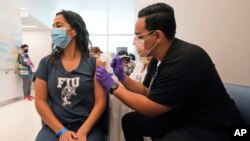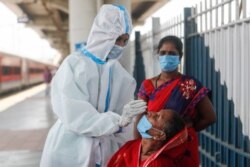The COVID-19 vaccine could become an annual injection, like the flu shot, according to the head of a pharmaceutical giant and the chief science officer of the U.S. pandemic response.
Pfizer CEO Albert Bourla said during a pre-recorded conversation hosted by CVS Heath Corporation that “The Covid virus looks more like the influenza virus than the polio virus.” The polio shot is generally a childhood inoculation, while the flu shot is administered every year.
More research is needed, Bourla said, but the “likely scenario” will be a third dose of the current shots “somewhere between six and 12 months, and from there it would be an annual re-vaccination.”
Similarly, David Kessler, working with the White House COVID response, told lawmakers Thursday at a House subcommittee hearing the U.S. should plan for COVID booster shots.
Kessler said the Biden administration is still “studying the durability of the antibody response,” following vaccinations, but “I think we should expect that we may have to boost.”
Health officials in India said they counted more than 200,000 new COVID-19 cases Thursday, an all-time daily high for the South Asian nation.
The surge in cases has India scrambling to find hospital beds and oxygen. The escalating tally has also forced India, a major vaccine producer, to delay global shipments of COVID vaccines and instead redirect them for use at home.
New Delhi health official S.K. Sarin, told the Associated Press that the case surge is “alarming.”
Some public health officials also say they believe a Hindu festival at which hundreds of worshippers bathed in the Ganges, as well as recent political rallies, may have contributed to the landmark surge.
More than 30% of U.S. adults, about 78.5 million, are fully vaccinated for COVID-19, according to new data released by the U.S. Centers for Disease Control and Prevention.
The CDC said 48% of adults have received at least one dose of the vaccine, as have 80% of seniors, who are the most vulnerable to the harmful effects of the virus. Sixty-four percent of seniors are fully vaccinated.
The CDC also reported about 5,800 so-called breakthrough cases of people who have been vaccinated but still contracted the virus.
"All of the available vaccines have been proven effective at preventing severe illness, hospitalizations and deaths," the agency said in a statement. "However, [as] with other vaccines, we expect thousands of vaccine breakthrough cases will occur, even though the vaccine is working as expected."
The CDC data come amid a temporary halt in administering the Johnson & Johnson vaccine.
An independent panel of U.S. health experts is delaying a final decision about Johnson & Johnson’s single-dose COVID-19 vaccine as they get more information about the vaccine and possible links to a rare but dangerous blood clot.
The CDC’s immunization advisory committee held an emergency meeting Wednesday, one day after the CDC and the Food and Drug Administration issued a joint statement recommending a pause after six women between 18 and 48 years of age developed blood clots known as cerebral venous sinus thrombosis within six to 13 days after being inoculated. One of the women died, while another has been hospitalized in critical condition.
The six cases are among more than 7 million Johnson & Johnson inoculations nationwide.
Dr. Beth Bell, a global health expert at the University of Washington, was one of the members who argued in favor of gaining more information. But Bell called the blood-clotting incidents “a very rare event” and insisted she didn’t want to send a message “that there is something fundamentally wrong with this vaccine.”
But the reports prompted the U.S. pharmaceutical giant Tuesday to announce it was delaying rollout of the vaccine in Europe, where vaccination efforts have been plagued by a shortage of vaccines and logistical problems, as well as the troubled rollout of the AstraZeneca vaccine, which has also been linked to cases of rare blood clots.
Both the AstraZeneca and Johnson & Johnson vaccines were developed by using so-called adenoviruses to carry DNA into human cells that generates the body’s immune system to ward off the coronavirus.
The issues with the AstraZeneca and Johnson & Johnson vaccines led the European Union to announce Wednesday that 50 million doses of the Pfizer COVID-19 vaccine that it was initially slated to receive by the end of the year will be delivered by June, adding to the 200 million doses it was already expecting to receive by then.
Despite the problems, there was some good news in Europe.
COVID-19 cases are declining among Europeans 80 and older, and death rates in the age group are at the lowest level since the pandemic began, according to a World Health Organization official.
Speaking Thursday during a virtual news briefing in Athens, WHO Regional Director for Europe Hans Kluge credited the improving trend to vaccination programs across the continent, which prioritized the elderly.
But Kluge said that was the only silver lining to the otherwise serious COVID-19 situation facing Europe. He said the region is averaging 1.6 million new cases a week and more than 9,500 new cases per hour. Last week, Europe surpassed 1 million deaths since the pandemic began.
The world is nearing 3 million deaths from COVID-19 out of 138.8 million confirmed total cases, according to the Johns Hopkins Coronavirus Resource Center. Many nations are seeing a new surge of the virus, which is throwing doubt and confusion over numerous planned events, including the upcoming Tokyo Olympics.
Toshihiro Nikai, secretary-general of Japan’s ruling Liberal Democratic Party, said Thursday during a televised interview the Olympics should be canceled if the current wave of new infections grows out of control. His remarks came 99 days before the July 23 opening ceremony.
With Tokyo and other parts of Japan under a state of emergency to quell a surge of new infections, public opinion polls show an overwhelming majority of Japanese believe the games should be postponed again or canceled.








